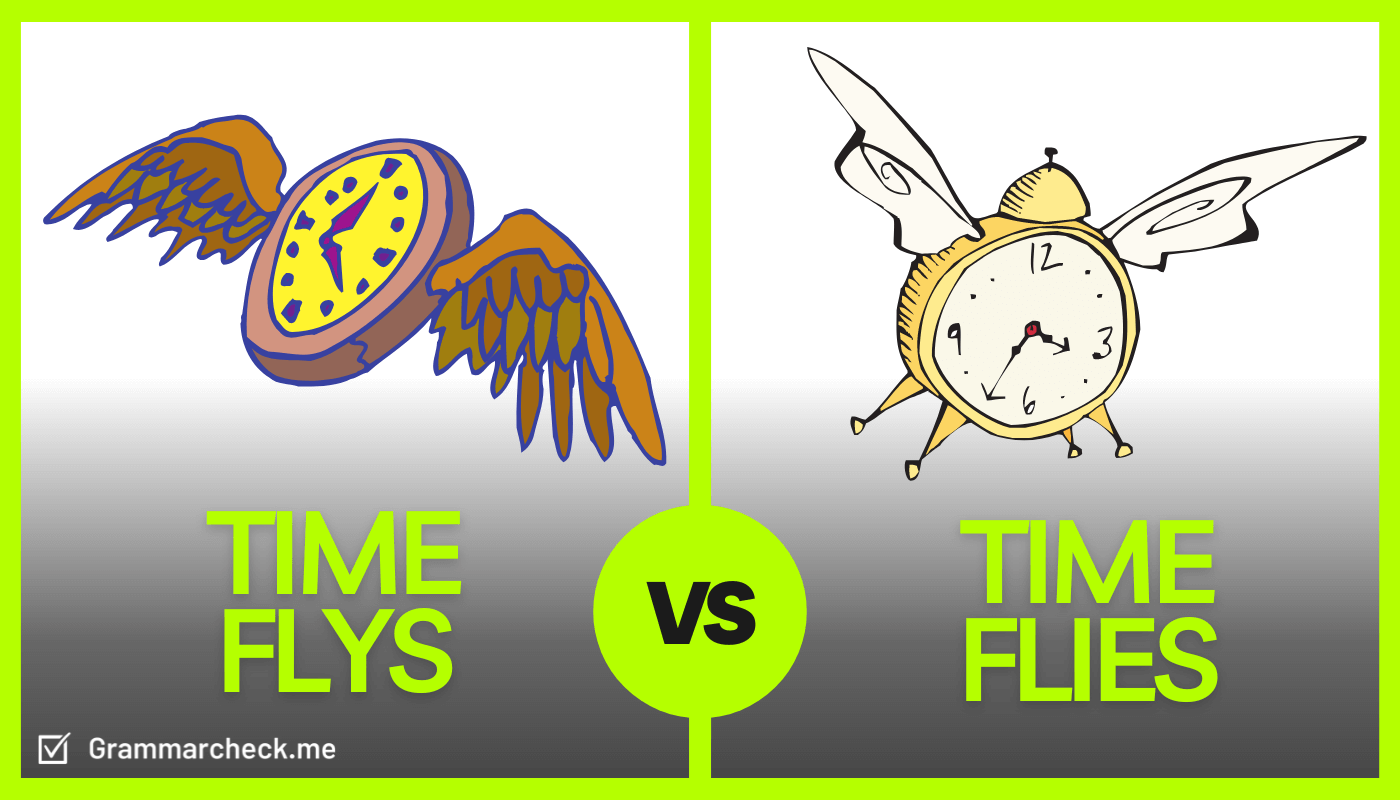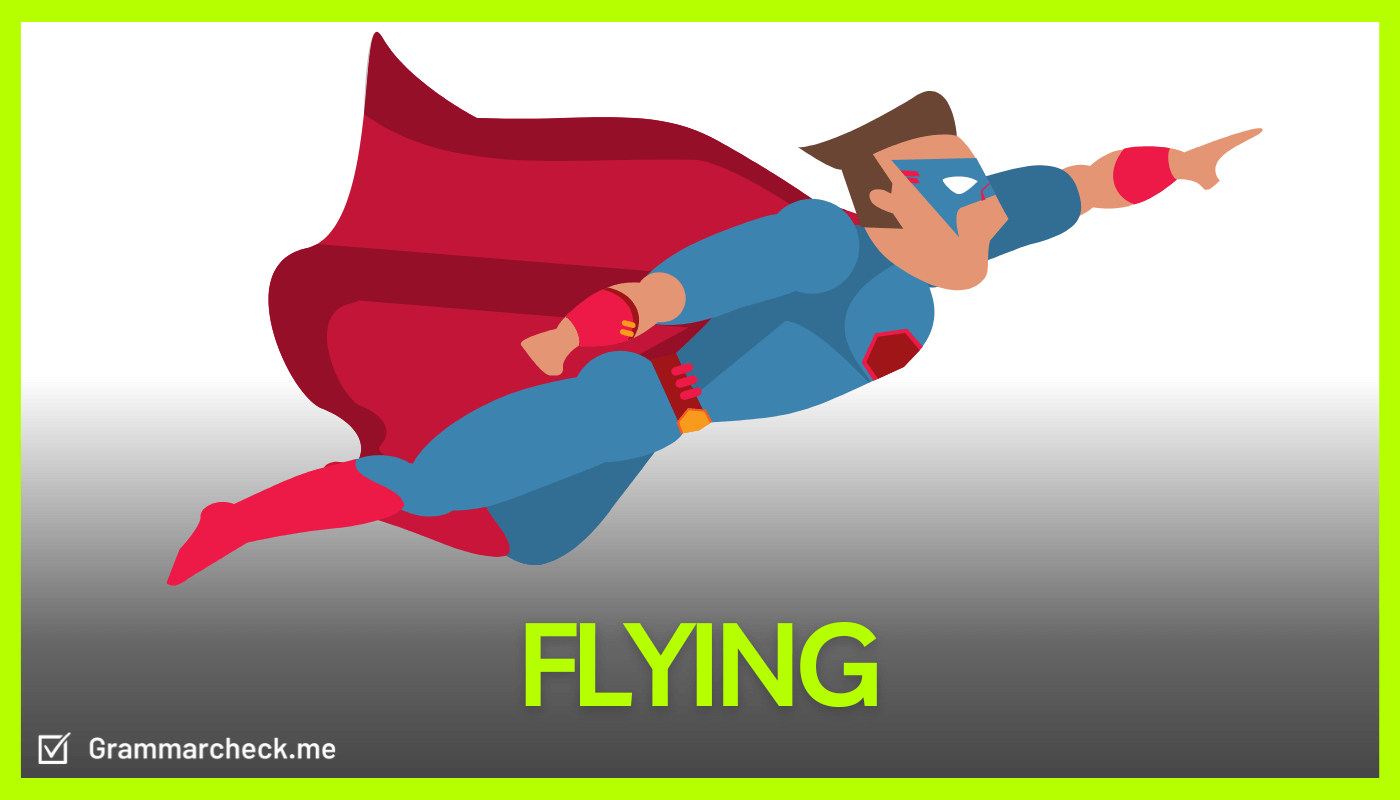Is it time flys or time flies? Find out how to spell this common phrase in this article.
To make a noun plural, you usually only have to add an “s” to the end. The same rule also applies to verbs. However, this isn’t the case with irregular nouns and verbs, of which the English language has many.
Sometimes it’s hard to recognize an irregular noun or verb, especially to make the word plural. This is especially the case for words that are both verbs and nouns, such as the word “fly.”
Is the correct plural spelling of “fly” “flys?” What about in the case of the phrase “time flys?” Keep reading to find out whether it’s “time flys” or “time flies” and other peculiar rules.
Always using the right words? Make sure:
Check Your TextStart with the Basics: Fly or Flies?

Before getting into the expression in question, let’s first determine whether it is “fly” or “flies.” Let’s start by discussing the noun “fly.”
Fly as a Noun
As you know, a fly is the name of a particular type of insect. It is possible to refer to many of these particular insects at once, and if you do, you should spell the plural form of “fly” as “flies.”
For this reason, the word “fly” is considered an irregular noun, meaning it doesn’t conform to the usual “tack on an ‘s’ at the end’” rule that other verbs do, such as “insect” and “insects.” Specifically, “fly” is classified under “-y” nouns, for which the rule is to remove the “y” and replace it with “ies,” hence the word “flies.”
Now let’s discuss the use of “fly” as an action verb in your writing.
Fly as a Verb
As a verb, to fly means to move through the air, typically with wings, although this isn’t always the case, as balls and other objects can fly through the air. Although the verb has a different meaning, and therefore different rules apply, you still get the same result.

When you conjugate the word “fly” into the third-person singular present tense, it becomes the word “flies.” In other words, if you’re describing “he,” “she,” or “it” doing an action, you must use the word “flies” to finish the description. Just play close attention to the subject & verb agreement in your writing.
The same rule is true with several other English language verbs that end with the letter “y.” Some common examples include:
- To reply: he replies, she replies, it replies
- To supply: he supplies, she supplies, it supplies
- To cry: he cries, she cries, it cries
To further illustrate the irregularity of this verb, the past tense of “to fly” is “flew,” while the past participle is “flown,” which are two forms that also don’t conform to standard grammar rules.
Whether you use the word fly as a noun or a verb, “flys” is never a word that you should use in any context. The main reason for this is aesthetic purposes. “Flys” does not look right, and misspelling the word in this way can throw off your entire sentence.
This leads to the question, is the phrase “time flys” or “time flies”? Let’s find out.
Time Flys or Time Flies?
If you’re wondering whether to use the phrase time flies by or flys by, the correct word is always time flies. The verb is used here to describe what time does, “time” being a third-person noun. Although time is a concept, it is typically personified as a singular noun.
- Just like we saw in our comparison of the words edition or addition, small spelling mistakes can totally change the meaning of a word.
This phrase is in the present tense, but it’s also possible to say it in other tenses using the irregular verb fly. Here is the phrase in a different tense:
- Past tense: Time flew by.
- Future tense: Time will fly.
- Present progressive tense: Time is flying.
Meaning of Time Flies
It’s hard to grasp the spelling of “time flies” if you’ve never even heard the saying before.
If you’ve never used or even heard the expression, this odd-sounding phrase means that time moves quickly. It’s used when people have the perception that time is passing quickly.
One of the most common ways people use the phrase is by saying, “time flies when you’re having fun.” However, there are many different ways that you can use the phrase.
Frequently Asked Questions
The saying “time flies” means that time seems to be moving by fast. For example, you might say “time flies when I am playing with my friends.”
Yes, you can say time flies as a way to indicate time is passing quickly. For example, you might say “time flies when I go to the gym and lift weights.”
The saying “time flies” is a very common idiom to indicate that a period of time is passing by quickly.
Final Thoughts
To sum up, you should remove the word “flys” with this spelling from your vocabulary if it’s how you’re currently spelling this verb or noun. The word does not exist in the modern English language beyond being the incorrect spelling of the word “flies.”
It’s essential to recognize that “fly” is an irregular verb and noun and therefore does not conform to the standard rules. This translates to how you would spell the common expression “time flies.” If this is your first time hearing about this expression, you now know when exactly to use it! And if you need some extra help with this spelling rule, consider using our rewriter tool FREE of charge!
